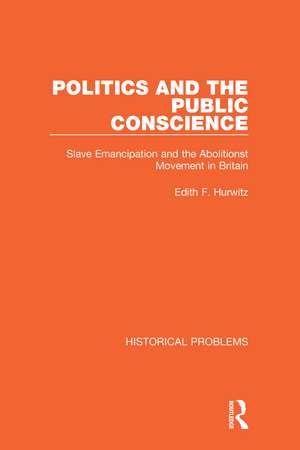Politics and the Public Conscience: Slave Emancipation and the Abolitionst Movement in Britain: Historical Problems
Autor Edith F. Hurwitzen Limba Engleză Hardback – 26 iul 2021
| Toate formatele și edițiile | Preț | Express |
|---|---|---|
| Paperback (1) | 302.62 lei 43-57 zile | |
| Taylor & Francis – iul 2023 | 302.62 lei 43-57 zile | |
| Hardback (1) | 699.46 lei 43-57 zile | |
| Taylor & Francis – 26 iul 2021 | 699.46 lei 43-57 zile |
Din seria Historical Problems
-
 Preț: 310.26 lei
Preț: 310.26 lei -
 Preț: 306.11 lei
Preț: 306.11 lei -
 Preț: 306.86 lei
Preț: 306.86 lei -
 Preț: 304.32 lei
Preț: 304.32 lei -
 Preț: 308.22 lei
Preț: 308.22 lei -
 Preț: 302.62 lei
Preț: 302.62 lei -
 Preț: 308.06 lei
Preț: 308.06 lei -
 Preț: 304.32 lei
Preț: 304.32 lei - 37%
 Preț: 6218.51 lei
Preț: 6218.51 lei -
 Preț: 304.32 lei
Preț: 304.32 lei -
 Preț: 307.07 lei
Preț: 307.07 lei -
 Preț: 300.75 lei
Preț: 300.75 lei -
 Preț: 306.86 lei
Preț: 306.86 lei
Preț: 699.46 lei
Preț vechi: 822.90 lei
-15% Nou
Puncte Express: 1049
Preț estimativ în valută:
133.88€ • 145.48$ • 112.54£
133.88€ • 145.48$ • 112.54£
Carte tipărită la comandă
Livrare economică 21 aprilie-05 mai
Preluare comenzi: 021 569.72.76
Specificații
ISBN-13: 9781032037981
ISBN-10: 1032037989
Pagini: 180
Dimensiuni: 156 x 234 x 11 mm
Greutate: 0.49 kg
Ediția:1
Editura: Taylor & Francis
Colecția Routledge
Seria Historical Problems
Locul publicării:Oxford, United Kingdom
ISBN-10: 1032037989
Pagini: 180
Dimensiuni: 156 x 234 x 11 mm
Greutate: 0.49 kg
Ediția:1
Editura: Taylor & Francis
Colecția Routledge
Seria Historical Problems
Locul publicării:Oxford, United Kingdom
Public țintă
Undergraduate CoreCuprins
Part 1: Introduction 1. Introduction 2. Ideological Trends in Anti-Slavery Thought 3. Politics and the Public Conscience: The Anti-Slavery Movement and the Emancipation Act, 1831-40 4. The Anti-Slavery Movement and British Society Part 2: Documents 1. From William Wilberforce An Appeal to the Religion, Justice and Humanity of the inhabitants of the British Empire on behalf of the slaves in the West Indies (London, 1823) 2. A brief view of the nature and effects of slavery as it exists in the colonies of Great Britain (London 1823) 3. From Memoirs of Sir Thomas Fowell Buxton, Baronet, with selections from his correspondence, edited by Charles Buxton (American edition, Philadelphia, 1849) 4. From Report of the agency committee of the anti-slavery society (London 1832) 5. From Memoir of William Knibb, Missionary of Jamaica, by John Howard Hinton (London, 1847) 6. From Substance of an Address to the Ladies of Glasgow and Vicinity on Negro Emancipation – Mr Anderson’s Chapel – 5 March 1833, by George Thompson (Glasgow, 1833) 7. Petitions for the Abolition of Slavery 8. From the Speech of Edward Stanley, Secretary of State For the Colonies, Introducing the Government Plan for the Emancipation of Slaves, 14 May 1833 9. From the Petition of Lords Wellington, St. Vincent, Penshurst and Wynford Against the Emancipation Act, 20 August 1833 10. From Abolition of Slavery Act 1833: 3 & 4 William IV, c.73 11. From a Letter of Thomas Clarkson to William Smith, 1 September 1833.
Descriere
This book, originally published in 1873, analyses the factors which made the Anti-Slavery Movement so successful. It exposes the roots of its passionate support and explains How the government came to accept the objectives of religious idealists.
